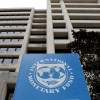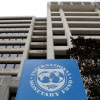IMF’s $4.7b loan: Two of 6 major conditions missed

Bangladesh has failed to meet two of the six quantitative targets set for the first half of 2023 by the International Monetary Fund for the $4.7 billion loan, with one of them being a mandatory condition.
The finance ministry has already written to the Washington-based multilateral lender explaining why the country missed the two conditions, The Daily Star has learnt from officials involved with the proceedings.
They have also explained the matter to Krishna Srinivasan, the IMF's director of the Asia and Pacific Department, when he called into Bangladesh last month.
The government has failed to maintain minimum net international reserves (NIR) of $24.46 billion at the end of June.
The NIR target was missed by about $3 billion as the government had to dip into reserves to pay for essential imports of fuel, fertiliser and foodstuff from the reserves, the finance ministry officials said.
The minimum tax revenue target will also be missed. The government needed to collect at least Tk 345,630 crore in tax revenue in fiscal 2022-23.
That target will be missed by about Tk 15,000 crore as collections slowed down as a result of the import curbs put in place to preserve the strained dollar stockpile.
Subsequently, the government will seek a waiver from meeting the two conditions from the IMF such that the second instalment of the loan can be released, the finance ministry officials said.
If a country misses a quantitative performance criteria (QPC) condition, the IMF executive board may approve a waiver if it is satisfied that the programme will still succeed. This may be because the deviation was minor or temporary or because national authorities are taking corrective actions.
Missed structural benchmarks (SB) and indicative targets (IT) do not require waivers but are assessed in the context of overall programme performance.
The minimum NIR is a QPC while the tax revenue floor is an indicative target.
The rest of the quantitative targets like the floor on budget, social spending and development capital investment and the ceiling on reserve money have been met.
The government has also met all six of the SBs for June 2023, the finance ministry officials said.
The SBs for June include the adoption of an interest rate corridor system, reporting official reserve assets as per the IMF's BPM6 definition and introduction of a market-determined exchange rate.
The central bank was supposed to complete the pilot risk-based supervision action plan and publish banks' distressed assets in the annual financial stability report as well.
The finance ministry has also adopted tax revenue measures yielding an additional 0.5 percent of GDP in fiscal 2023-24's budget.
The first review of the programme to assess the programme's quantitative targets and progress of reform implementation will take place in the last week of September or the first week of October.

 For all latest news, follow The Daily Star's Google News channel.
For all latest news, follow The Daily Star's Google News channel. 







Comments